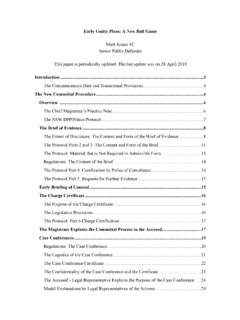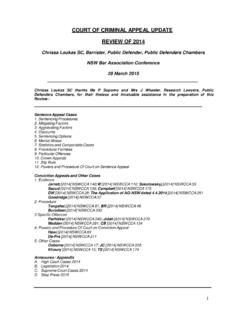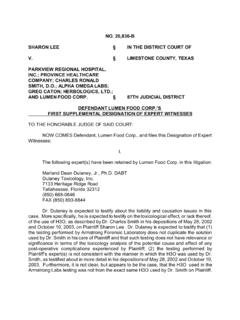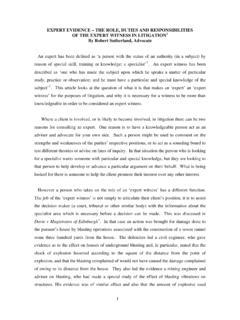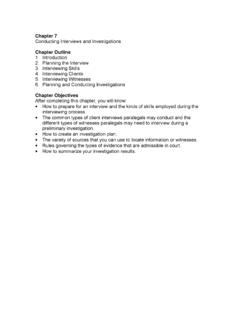Transcription of Jury views of psychological expert evidence about …
1 Jury views of psychological expert evidence about child sexual abuse Professor Annie Cossins, UNSW. Professor Jane Goodman-Delahunty, CSU. School of Psychology and Australian Graduate School of Policing and Security Legal background After recommendations by 3 Law Reform Commissions in 2005, s 79(2) was inserted as an exception to the opinion rule (s 76) which permits the admission of expert opinion evidence about children's behaviour and reactions to CSA. to bolster a child 's credibility in a CSA trial (s108C). Rationale: expert opinion evidence on child development and behaviour can in certain cases be important evidence in assisting the tribunal of fact to assess other evidence or to prevent inappropriate reasoning processes based on misconceived notions about children and their behaviour (ALRC, NSWLRC & VLRC, 2005, [ ]).
2 Very little case law on s79(2); anecdotally it appears the section is under-utilised in practice. School of Psychology and Australian Graduate School of Policing and Security Section 79(2). (1) If a person has specialised knowledge based on the person's training, study or experience, the opinion rule does not apply to evidence of an opinion of that person that is wholly or substantially based on that knowledge. (2) To avoid doubt, and without limiting subsection (1): (a) a reference in that subsection to specialised knowledge includes a reference to specialised knowledge of child development and child behaviour (including specialised knowledge of the impact of sexual abuse on children and their development and behaviour during and following the abuse), and (b) a reference in that subsection to an opinion of a person includes, if the person has specialised knowledge of the kind referred to in paragraph (a), a reference to an opinion relating to either or both of the following.
3 (i) the development and behaviour of children generally, (ii) the development and behaviour of children who have been victims of sexual offences, or offences similar to sexual offences. School of Psychology and Australian Graduate School of Policing and Security Scope of s79(2). The wording of s79(2) suggests that the section is limited to admitting research evidence about the general behaviours of children/victims of CSA. rather than clinical, diagnostic evidence from an expert who has interviewed the child However: a HC case on the application of s79(1) (HG v R. (1997) 197 CLR 414, at 428) suggested that an expert will also be able to give his/her opinion about whether the child 's behaviour is consistent with having been sexually abused as alleged.
4 For this reason, we investigated the impact of both research and clinical expert evidence in a CSA trial given the documented extent of jurors/laypeople's misconceptions about children and CSA. School of Psychology and Australian Graduate School of Policing and Security The study Professionally-acted video-trial, 45-55 mins long Opening and closing addresses by legal counsel EIC and X-X of 13 year old complainant EIC and X-X of complainant's grandmother No evidence from defendant Summing-up with standard judicial directions Compared three different experimental groups: Control (no expert witness). Experimental/research expert (psychologist): EIC and X-X. Clinical expert (psychologist): EIC and X-X.
5 School of Psychology and Australian Graduate School of Policing and Security Hypotheses Educative intervention by expert witness: Exposure to an expert witness will increase CSA. Knowledge compared to no expert (control group). The clinical psychologist will have a greater educative impact than the experimental psychologist. School of Psychology and Australian Graduate School of Policing and Security Case facts One count of sexual intercourse. The complainant: testified that, aged 12, she had been reading a book when her grandfather entered the loungeroom, bent over and stroked her leg, then the outside of her vagina before penetrating her with his finger. On her way to the loungeroom, the grandmother heard her granddaughter cry out : Stop it, it hurts.
6 When she entered the room, she saw that the complainant's pants were down and the defendant was doing up the belt on his pants. The complainant ran to her grandmother, crying, and reported the sexual assault. Defence: argued that the grandmother had coached her granddaughter as a form of revenge for the defendant's extra-marital affair. School of Psychology and Australian Graduate School of Policing and Security expert evidence Research expert : summarized empirical findings on counter-intuitive behaviors of sexually abused children, developmental aspects of children's memory, their reliability in reporting sexual abuse and suggestibility when questioned by adults. Did not interview the child .
7 Clinical expert : gave the same evidence but in addition, interviewed the child and stated that the complainant's behaviour was consistent with that of a sexually abused child . School of Psychology and Australian Graduate School of Policing and Security Participants 671 jurors who reported for jury duty in the District and Supreme Courts of NSW. They were either excused from jury duty or not empanelled and released 59% men, 41% women Aged 18 - 70 years Most held a university degree ( ), had a tertiary level diploma, had a trade certificate, finished high school, and reported fewer than 12. years of formal education. English was the first language for Most were parents or a guardian of a child (53%).
8 School of Psychology and Australian Graduate School of Policing and Security Procedures 334 deliberating and 325 non-deliberating jurors were randomly assigned to one of the 3 experimental conditions: Control group: no expert Research group: specialized CSA knowledge presented by an experimental/research psychologist Clinical group: specialized CSA knowledge presented by a clinical psychologist who interviewed the complainant 32 juries (8-12 jurors per jury). Juries chose foreperson, deliberated to unanimous or a majority verdict Deliberations: 12-87 mins School of Psychology and Australian Graduate School of Policing and Security Juror views : general comments Jurors struggled with how to interpret the expert 's evidence , and how much weight to give it Juries varied considerably in the amount of time spent discussing the expert 's evidence .
9 From less than a minute to more than hour Clinical expert generated more delib than research expert Jurors used expert 's evid for a credibility purpose Applied the same amount of skepticism to the expert 's evidence as other witnesses' evidence Basic premise for most jurors encapsulated below: J1: as a juror .. you give benefit of the doubt, unless there's expert , sort of, evidence , or things like that.. Either work on the evidence , or you work on gut feeling, that's the choice you've got. (S5J3). School of Psychology and Australian Graduate School of Policing and Security What jurors want .. Is a valuable (that is, definitive) expert J8: an expert opinion - it's probably my view - anyone's got an expert opinion.
10 Anyone's got an expert opinion if you're in that particular trade.. But whether it's a valuable expert opinion. J10: It's his job to give his expert opinion as a clinician, which he did, so I can't personally discount that.. J8: Yes, that's - that's the bit I don't agree. J1: I don't agree it supported the events.. J10: Because he kept an open mind of other possibilities. (S5J3; hung jury). School of Psychology and Australian Graduate School of Policing and Security Use of research expert 's evidence Some juries wondered why the research expert hadn't interviewed the complainant; as a result most jurors dismissed the evidence . For example, in S4J1: J1: I mean anything the expert said you take with a grain of salt because nothing's a blanket rule for everyone anyway.




